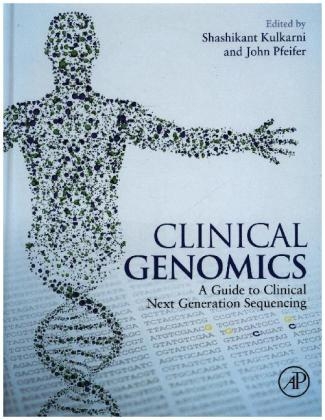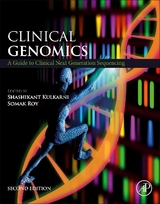
Clinical Genomics
Academic Press Inc (Verlag)
978-0-12-404748-8 (ISBN)
- Titel erscheint in neuer Auflage
- Artikel merken
Clinical Genomics provides an overview of the various next-generation sequencing (NGS) technologies that are currently used in clinical diagnostic laboratories. It presents key bioinformatic challenges and the solutions that must be addressed by clinical genomicists and genomic pathologists, such as specific pipelines for identification of the full range of variants that are clinically important.
This book is also focused on the challenges of diagnostic interpretation of NGS results in a clinical setting. Its final sections are devoted to the emerging regulatory issues that will govern clinical use of NGS, and reimbursement paradigms that will affect the way in which laboratory professionals get paid for the testing.
Dr. Shashikant Kulkarni is the Head of Clinical Genomics, Genomics and Pathology Services and also the Director of Cytogenomics and Molecular Pathology at Washington University School of Medicine. In addition, he is Associate Professor of Pathology and Immunology, Pediatrics, and Genetics. His lab's principle research interest is delineation of novel genomic structural and single nucleotide variants in cancer. Dr. Somak Roy is an Assistant Professor, in the division of Molecular and Genomic Pathology, at the University of Pittsburgh Medical Center, in Pittsburgh, PA. He is also Director of Molecular Informatics and the Director of the MGP Fellowship Program, and Associate Laboratory Director of the Division of Molecular and Genomic Pathology. Dr. Roy's research is focused on understanding mechanisms of urothelial carcinogenesis and metastasis using next generation sequencing and microarray technologies. He also develops biomedical informatics solutions for optimizing clinical laboratory operations and quality management.
Section 1: Methods
Overview of technical aspects and chemistries of NGS: Dr Robi Mitra, Washington University School of Medicine.
Non-selective methods (genome-wide): Dr Mark Bogoski, Harvard Medical School
Capture based methods (exome, panels) Dr Birgit Funke, Harvard Medical School
Amplification based methods (panels): Dr Madhuri Hegde, Emory Medical School
Emerging technologies (Nanopore and others); impact on cost and turnaround time: Dr Elaine Mardis, Washington University School of Medicine.
Section 2: Bioinformatics
Base calling and alignment; quality metrics; depth of coverage: Dr Carl Volkerding, University of Utah, ARUP labs
Single nucleotide variants (SNVs): Dr David Spencer, Washington University School of Medicine
Insertions and deletions (Indels): Drs Eric Duncavage and Haley Abel, Washington University School of Medicine
Large structural alterations (big deletions, translocations, and so on): Dr Charles Mullighan, St Jude’s Cancer Institute
Copy number variants (CNVs): Dr Mary-Claire King, University of Washington
Section 3: Interpretation
Reference data bases for disease associations: Dr Heidi Rehm, Harvard Medical School
Reporting of results; level of evidence for associations; classes of associations: Dr Shashikant Kulkarni, Washington University School of Medicine
Constitutional diseases (with individual chapters on hypertrophic cardiomyopathy, congenital deafness, blindness, cancer syndromes, and so on): Dr David Bick and Dr David Dimmock, Medical College of Wisconsin
Cancer (with individual chapters on leukemia, lymphoma, lung cancer, colon cancer, and so on): Dr John Pfeifer, Washington University School of Medicine
Section 4: Regulatory Issues
Assay validation: Dr Ira Lublin, CDC and Dr Elizabeth Mansfield FDA
QA/QC/PT issues: Dr Elaine Lyon, University of Utah, ARUP labs
Consent and privacy issues: Dr James DuBois, Albert Gnaegi Center for Health Care Ethics
Section 5: Reimbursement
Billing: Andrew Drury and Kris Rickoff, Washington University School of Medicine
| Verlagsort | San Diego |
|---|---|
| Sprache | englisch |
| Maße | 216 x 276 mm |
| Gewicht | 1590 g |
| Themenwelt | Studium ► 2. Studienabschnitt (Klinik) ► Humangenetik |
| Studium ► Querschnittsbereiche ► Epidemiologie / Med. Biometrie | |
| Naturwissenschaften ► Biologie ► Genetik / Molekularbiologie | |
| ISBN-10 | 0-12-404748-3 / 0124047483 |
| ISBN-13 | 978-0-12-404748-8 / 9780124047488 |
| Zustand | Neuware |
| Haben Sie eine Frage zum Produkt? |
aus dem Bereich



